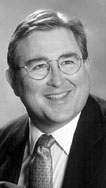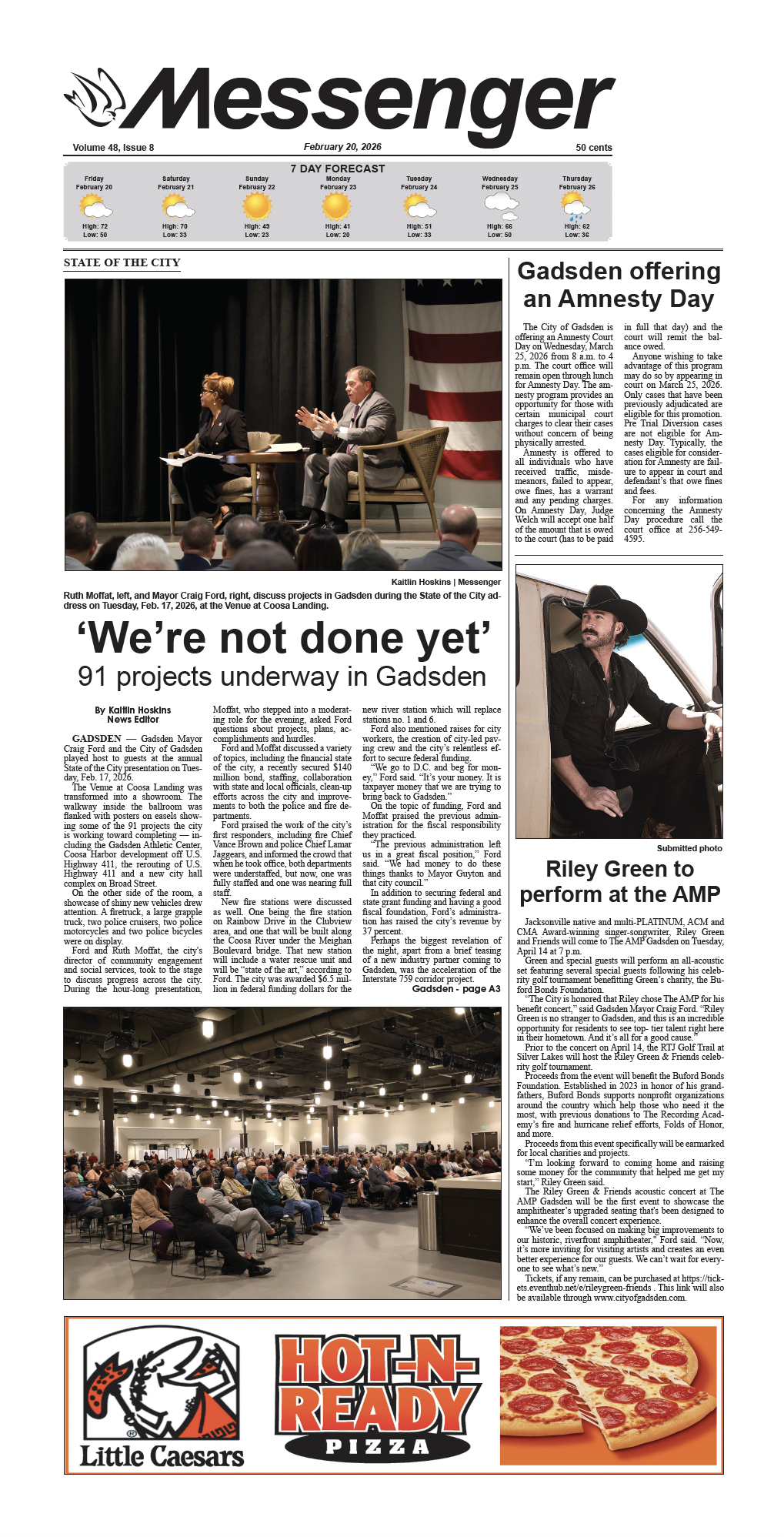The Vagabond recently pulled up an article from the Etowah Historical Society library called “Early History of Northeast Alabama,” which contained a section called “A History of Gadsden ” by Charles P. Smith, who was mayor of Gadsden in 1905-1906. Smith was known as “The Hooter of Owls Hollow” who wrote his reminiscences. He wrote six extremely interesting and historically valuable essays, beginning on Nov. 14 and ending on Dec. 19. Smith is a writer of unusual ability and his style is easy, flowing and somewhat elaborate, with spontaneous bits of wit and humor bursting out all along. It makes his essays exceedingly attractive and readable and shows a very decided literary turn. We continue with his story:
“Westward Ho! The star of the Empire takes its course, so Gadsden began to grow west from the river in 1845 with snail like rapidity. But first, to revise a little of my thrilling chapter of last week, the printer made it say, that Turrentine Hotel was Gadsden’s first house, which it was not by several shots. It was Gadsden’s first hotel.
“It also said in the post script, which I thought was to be the cutest thing in the whole chapter. In the meantime, the Coosa was running right along from Rome to Greenport, stopping at the ports of Gadsden, gwine and er comin,’ which could be construed into meaning that the Coosa River ran to Greenport, stopped short, and turned right back to Rome. Which would be a direct insult to the dignity of the grand old river.
“In fact, the river would not do it if it could. Its flow will ever be onward to the Gulf and to the Atlantic, inviting and pleading with our great statesmen to repair and fix up her weak places so that she may carry the product of the fertile valleys and mountains of North Alabama, together with its rich and varied minerals on out through the Panama Canal, to the countless millions of the empires of the east, and the world, adding wealth and permanent prosperity to this part of the domain of Old Glory, making conquests of peace with bombardments of food, cotton, and iron, which will make our great country arbiters of peace for the nations of the world, to say nothing of the material aid it will give in ‘the Benevolent Assimilation of the Philippines’ with its Ingrotos, dog-eaters and priests of Baal. It will come within the memory of the present generation. But [as] to the Coosa, I meant of course the steamboat ‘The Coosa,’ that was running right along.
“But to the history – I flew off at a tangent following the wanderings of a feeble mind. History is hard to write, dry and uninteresting except to those to whom the theme may appeal. There is absolutely no written history of the men and events of the earlier development of Gadsden.
“I am wholly dependent upon the kindness of Mr. J.R. Hughes and Judge Moragne, whose memories are vague as to dates and time in which many things that happened along up to the war. They admit this, as is naturally the case where one’s memory does not retain all the details for 50 or 60 years.
“In my own ease, I do not know now the date that Gen. Funston was sent to Vera Cruz. And blast me if I know what the world’s greatest and most cruel and destructive war is about today, except by taking the perfectly unbiased statements of England, Germany, France, Austria-Hungary, Russia, Servia and Belgium.
“Only I do think it a disgrace to European civilization to involve the unspeakable Turk, those of India, and the chesty little Japaneses [sic], in further prolonging a war of ruin and devastation.
I see only a war prompted by greed and avarice. May the Lord be both a husband and a father to the widows and orphans left in the wake.
“My mind again wanders. Now to the history.
“On the north side of Broad Street next to the corner occupied by Whorton the druggist, came the general store of Hill & Cansler about 1845 to ‘46, which was succeeded by Hill & Sulzer, who continued the business. Mr. Sulzer’s widow and daughter (Mrs. R.W. Crane) are living here today.
“Many people will remember old man Cansler of the Cansler Addition fame. Next is the post office [of] J.D. McMichael, P.M., the back of which was occupied by C.P. Owens, Gadsden’s first tailor, 1846 to ‘47.
“Next is the saloon of Wiuf Livingston, 1847 to ‘48. Next is the grocery store of J.D. Vann with accessories in the early fifties.
“Next is the general store of W.E. Lucy & Co. in 1848 to ‘49. W.E. Lucy was the father of our present esteemed citizen of that name, who married the sister of the wife of Mrs. Gen. Turrentine (the elder Lucy) was thus made the present. W.E. Lucy was a first cousin of all the children of Gen. Turrentine.
“Directly in the rear of Tom Hollingsworth’s store, being later succeeded by A. Beyers & Co., which was next to Lucy & Co. (about which something will be said later), was the saloon of George Holloway, a typical house of homemade corn whiskey with a fight in every drink. And fight they did, from early morning till dewey eve.
“Saturday, however, was the Grand Day, when the rugged pioneers from all the country round about, met by appointment to settle their difficulties. Early in the morning they would begin coming in droves from every direction and at once proceed to George’s place to ‘discuss matters.’
Preliminary to the discussion and just to show that they had ‘nothing agin one another,’ they took several rounds of good old corn, the arguments proceeding in a mild sort of a way. They took more drinks and the arguments became more emphatic. They then took more and more drinks until their faces became red, bloated and vindictive, with anger shooting from their eyes.
“The real festivities of the Grand Day began, they went to it; ‘I am a man, suh. No living man can talk to me in that insulting way suh.’ The fight was on, fist and skull, chairs and bottles, pell-mell, until George’s place was demolished and the belligerents had exhausted themselves smashing heads, blacking eyes, and fierce kicking, that left every spot on their anatomy bruised and sore. They were assisted to their horses by sympathetic friends. They were like the old Egyptians silently folded their tents and moved away, but with unconquered spirits, re-solving to get in training for the next Grand Day.
“On the south side of Broad Street there were no buildings except the Turrentine Hotel, up to the present location of Caldwell-Spence Wholesale Grocery, on which site a general store was built and occupied by A.D. Hughes and Vincent, about 1850, who were succeeded by John T. Henry in the later fifties, a brother of the late Col. Sam Henry.
“Many people are manifesting much interest in this attempted history of ante bellum Gadsden and are offering valuable suggestions therewith. I will be thankful for all aid that can be furnished me to make the details as accurate as possible.
A written record of these events should be greatly appreciated by the people of Etowah, St. Clair, DeKalb, Cherokee, Blount and Marshall counties, as it is positively the first written history dealing in detail with Gadsden before 1855 or ‘56 and prior to 1840, including these counties as the last part of Alabama from which the Indians were removed and cut up into counties after many changes.”




